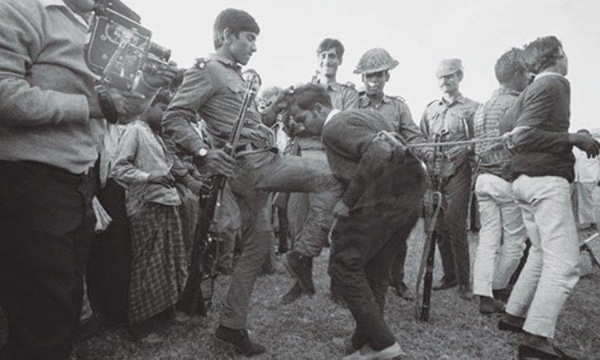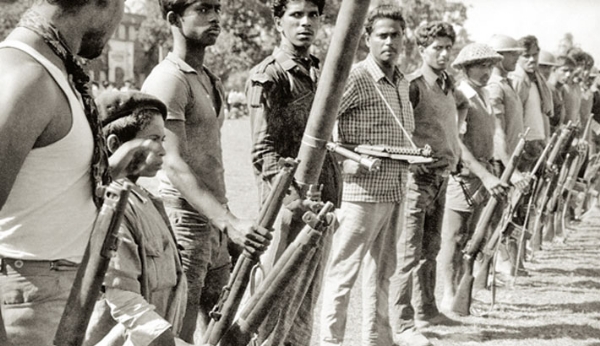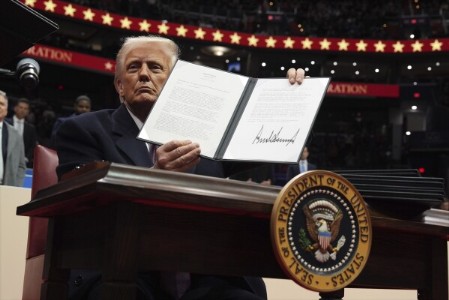Bangladesh Muktijuddha Mancha's memorandum to Pakistani PM for an unconditional apology for atrocities & war crimes executed in 1971
"Request the government of Pakistan in general and Pakistani Army in particular, to offer an unconditional apology to our Prime Minister and leader Sheikh Hasina and to the people of Bangladesh for the brutalities in Bangabandhu killing, 21st grenade attack and the atrocities of 1971 liberation struggle."
Total Views | 237
Dhaka, Dec 15: Bangladesh Muktijuddha Mancha (BMM) wrote a memorandum to Pakistan's Prime Minister Shehbaz Sharif and requested an unconditional apology for the attack and atrocities during the 1971 liberation war.

In the memorandum, BMM writes, "Request the government of Pakistan in general and Pakistani Army in particular, to offer an unconditional apology to our Prime Minister and leader Sheikh Hasina and to the people of Bangladesh for the brutalities in Bangabandhu killing, 21st grenade attack and the atrocities of 1971 liberation struggle."
The memorandum also demanded Pakistan to desist, overtly or covertly, from engaging with those forces that stood against our freedom struggle and also the trial of the Pakistani army involved in killings and Genocide during the Liberation War of Bangladesh in 1971. In the memorandum, Bangladesh Muktijuddha Mancha reminded about the 1971 Liberation struggle of Bangladesh and said thirty Lakhs people were killed and Pakistani militaries raped two lakhs of women, during the war.
The party also said that Pakistan ISI was directly involved in Bangabandhu Sheikh Mujibur Rahman killing. "To take revenge for surrender in the Liberation War, Pakistan started conspiring against Bangabandhu's government. With the help of Zia-Mostaque, Pakistan killed Bangabandhu and his family members which was the most brutal political killing in the world," the memorandum reads.
Pakistan also patronised and supplied grenades to BNP-Jamaat-Huji to kill Bangabandhu's daughter Shiekh Hasina on August 21, 2004. Some Awami League leaders created human protection to save the life of Sheikh Hasina. Finally, Sheikh Hasina was saved but 24 Awami League leaders were killed due to grenades attack," it added. Bangladesh Muktijuddha Mancha also said that Pakistan cannot avoid responsibility for these killings. Party threatened Pakistan and said that if the country continues sponsoring terrorism in Bangladesh, they will make that their government would be bound to cut all diplomatic relations with Pakistan.
"We demand to United Nations to bring the Pakistan militaries under the trial of the International War Crimes Court for their involvement in genocide and intellectuals killings in 1971," the party concluded the sentence. The latest good news for Bangladesh is that Pakistan's "genocide" against Bengalis, and Hindus in the 1971 war has been finally recognized as the US House condemns Islamabad's actions and called on President Joe Biden to recognize the atrocities. The legislation brought by Congressmen Ro Khanna, and Steve Chabot, recognize Pakistan's atrocities against ethnic groups constitute crimes against humanity, war crimes, and genocide.
"...condemns the atrocities committed by the Armed Forces of Pakistan against the people of Bangladesh from March 1971 to December 1971; recognizes that such atrocities against ethnic Bengalis and Hindus constitute crimes against humanity, war crimes, and genocide; calls on the President of the United States to recognize the atrocities committed against ethnic Bengalis and Hindus by the Armed Forces of Pakitan during 1971 as crimes against humanity war crimes, and genocide," the legislation read.
What is the 'Bangladesh Muktijuddha Mancha' (BMM)?
The name 'Bangladesh Muktijuddha Mancha' is associated the 'Muktijoddha Sangsad', which is a non-political welfare association of the combatants during the Bangladesh Liberation War formed on Feb 13, 1972.

Archived photo of the Mukti Bahini
After the Partition of India, East Bengal that represents Bangladesh today, became a province of Pakistan and was thus later named East Pakistan. The relation between East and West Pakistan deteriorated after the partition, due to various reasons. In 1970 Pakistan general election was won by the East Pakistan-based Awami League which was led by Sheikh Mujibur Rahman. The Pakistan Military government refused to handover power to Sheikh Mujibur Rahman.
On Mar 25 1971 Pakistan military launched 'Operation Searchlight' in East Pakistan, which was initially aimed at attacking political opponents in East Pakistan and thus the Bangladesh Liberation war started. The Mukti Bahini was formed by Bengali personnel of Pakistani security forces and civilians to fight for the Independence of Bangladesh. The Mujibnagar government, that was the Bangladesh government in exile commanded the Mukti Bahini. The war ended on Dec 16 1971, through the signing of Pakistani Instrument of Surrender.
According to the available data, about 3 million people had died and about 0.3 million women were raped by Pakistan military and allied paramilitaries. 'Muktijoddha Sangsad' was formed on Feb 13 1972, to preserve the memories of the Bangladesh Liberation war and look after the welfare of former Members of the Mukti Bahini. The organization aimed to find out living freedom fighters and give them national recognition.
The atrocities carried out by the Pakistani armed forces during the Bangladesh Liberation war against ethnic Bengalis and Hindus in Bangladesh have remained unnoticed and unaddressed by the rest of the world. The 'Bangladesh Muktijuddha Mancha' has thus been fighting the battle since almost 50 years so that culprits of the war crimes committed in 1971 are made to pay for their misdeeds.
--







